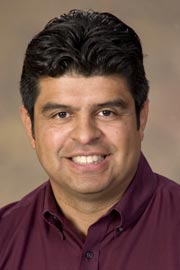Reducing cardiovascular disease and complications among Hispanic diabetes patients in Arizona is the focus of a new research project at the University of Arizona Health Sciences.
Cardiovascular disease is the leading cause of early death among people with diabetes – and U.S. Hispanic adults of Mexican descent experience an even greater burden of diabetes, with a prevalence rate almost twice that of non-Hispanic whites.
According to the National Institutes of Health, people with diabetes are at higher risk of heart disease than those without the disease and they may develop heart disease at a younger age.
The study’s lead investigator Tomas Nuño, PhD, assistant professor of public health practice and translational research at the UA Mel and Enid Zuckerman College of Public Health – Phoenix and the Department of Emergency Medicine at the UA College of Medicine – Tucson, says the world is facing a growing diabetes epidemic of devastating proportions.

Tomas Nuño, PhD
Dr. Nuño’s research seeks to determine the clinical outcomes and cardiovascular disease prevention behaviors and risk factors among Hispanic patients with diabetes living in Tucson and Nogales, Ariz.
“This will be a first step to provide information to develop large-scale public health interventions in Arizona to reduce cardiovascular disease disparities among Hispanic patients with diabetes,” says Dr. Nuño.
Dr. Nuño received a $437,000 diversity supplement grant (R01HL125996-03S1) for his three-year research project. The funding is part of $2.9 million grant from the National Institutes of Health (R01HL125996), awarded to the UA Zuckerman College of Public Health in 2015. The larger study focuses on the prevention of cardiovascular disease and its complications among adults with diabetes in Northern Mexico. It includes a multi-site randomized-controlled trial to evaluate tools and practices to decrease cardiovascular disease and complications in the population with diabetes.
“Our study in Sonora, Mexico, provides important research and implementation strategies for the U.S. population and Latino population in particular. Dr. Nuño’s research will build upon the infrastructure and lessons learned from our research to date,” said Cecilia Rosales, MD, MS, associate dean and professor of the UA Mel and Enid Zuckerman College of Public Health – Phoenix and principal investigator of the Sonora, Mexico, study.
Dr. Nuño’s Arizona study will employ the methods developed in the parent project and work with community health workers in Arizona to address the needs of the Hispanic population with diabetes in Tucson and Nogales, Ariz. The study will involve a sample size of 100 people (50 subjects in Tucson and 50 in Nogales).
The World Health Organization recognizes the need to address risk factors among Hispanics for adoption of scalable, evidence-based interventions that address healthful lifestyle promotion and disease management for diabetes patients, their families and communities. WHO also stresses the need to address cardiovascular disease globally by promoting interventions that address tobacco use, unhealthful diets and sedentary behavior.








